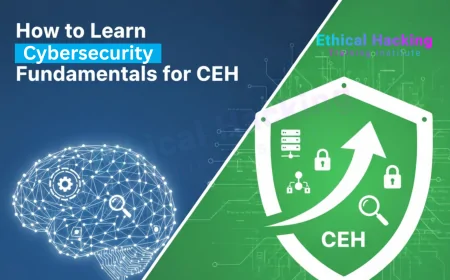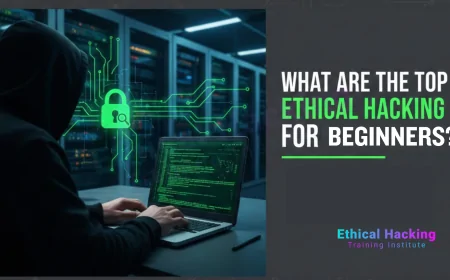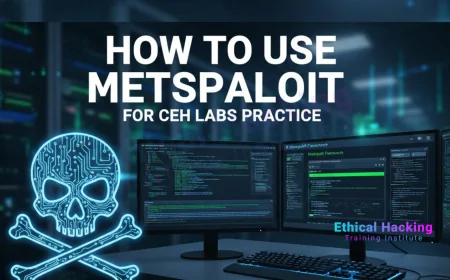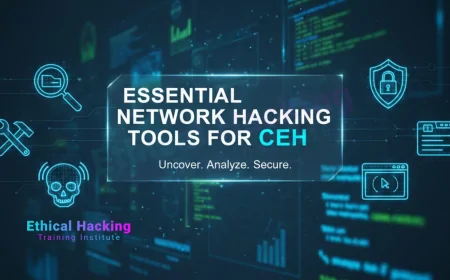How to Become an Ethical Hacker: The Essential Skills You Need to Know | How to Break into Ethical Hacking: Skills, Tools, and Career Tips
Discover how to become an ethical hacker with essential skills in networking, scripting, cybersecurity tools, and certifications. A complete step-by-step guide to starting your ethical hacking career.
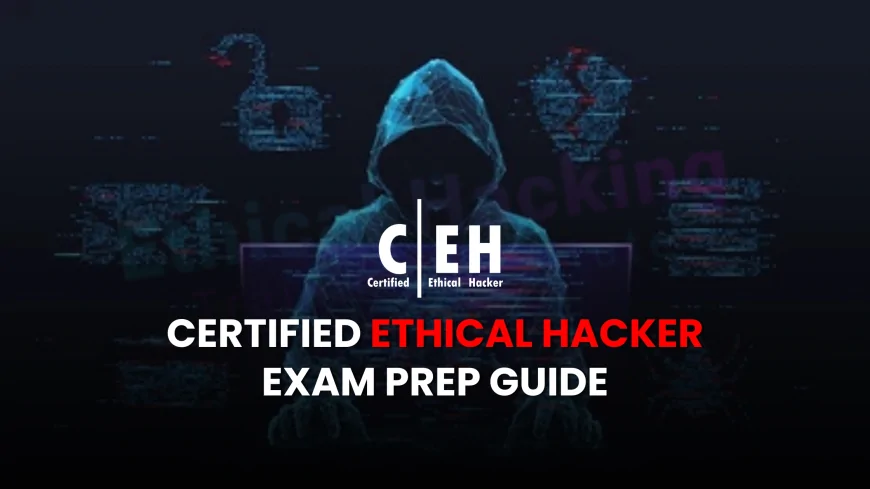
Table of Contents
- Introduction
- What Is Ethical Hacking?
- The Ethical Hacker's Mindset
- Technical Fundamentals
- Networking & Protocols
- Operating Systems Mastery
- Scripting & Programming
- Tools of the Trade
- Hands-on Lab Environment
- Penetration Testing Methodology
- Certifications & Career Path
- Soft Skills & Professionalism
- Mentorship & Community
- Overcoming Common Challenges
- Advancing Your Career
- FAQs
- Conclusion
Introduction
Becoming an ethical hacker means more than just hacking—it means using the same techniques as malicious actors, ethically and legally, to protect systems. This extensive guide explores the essential skills, tools, psychology, certifications, and real-world steps you’ll need to build a successful career in ethical hacking.
What Is Ethical Hacking?
Ethical hacking involves authorized security testing to find vulnerabilities before attackers exploit them. Ethical hackers follow strict methodologies and legal agreements to ensure responsible testing that helps organizations strengthen security.
The Ethical Hacker's Mindset
- Curiosity & Persistence: Always probing, questioning, exploring.
- Ethical Boundaries: Operating within authorized permissions.
- Attention to Detail: Small clues often reveal big weaknesses.
- Problem-Solving: Creative thinking to bypass defenses.
- Communication: Ability to clearly report findings and solutions.
Technical Fundamentals
Before hacking, you need strong technical foundations:
- TCP/IP & OSI Model: Understand packet flow and protocols.
- HTTP/HTTPS: Understand web communication protocols and how to protect data in transit.
- DNS: Learn how domain names are resolved and examine vulnerabilities used in DNS-based attacks.
- Virtualization: Use platforms like VirtualBox, VMware.
Networking & Protocols
- Subnetting and IP addressing
- VLANs, routing, switching fundamentals
- Network scanning (Nmap), sniffing (Wireshark)
Operating Systems Mastery
To become a successful ethical hacker, mastering both Linux and Windows operating systems is absolutely critical. Here's a breakdown of what you need to know and why:
Linux Mastery (Offensive Security Foundation)
Linux is the go-to OS for ethical hackers, pen-testers, and red-team professionals.
Key Linux Skills:
-
Command Line Interface (CLI): Learn bash scripting, file manipulation, networking commands (
ifconfig,netstat,nmap,iptables) -
File Permissions & Ownership: Understand
chmod,chown,umask -
Package Managers: Use
apt,yum,dnf,zypperfor installing tools -
Process & Service Management:
ps,top,kill,systemctl,cron -
Filesystem Navigation: Mounting, editing system files, directory traversal
-
SSH & Remote Access: Secure remote management and tunneling
-
Log Analysis: Inspect
/var/logfor activity monitoring and detection evasion -
Customizing Kali Linux/Parrot OS: Set up common hacking tools and environments
Windows Mastery (Essential for Real-World Targets)
Despite the prevalence of Linux in hacking tools, Windows systems dominate enterprise environments. Knowing Windows inside out is vital for real-world assessments.
Key Windows Skills:
-
PowerShell & CMD: Automate tasks, manipulate files, enumerate systems
-
Windows Internals: Understand Registry, services, scheduled tasks, and user accounts
-
Active Directory (AD): Essential for privilege escalation, domain enumeration, lateral movement
-
Group Policy Objects (GPO): Security policy configurations
-
Windows Event Logs: Study essential components like the Windows Registry, service control, task scheduling, and user access structures.
-
Common Tools: Use tools like Mimikatz, Sysinternals Suite, Netcat, and Windows Defender evasion methods
Cross-Platform Skills You Should Build
-
Privilege Escalation Techniques (Linux + Windows)
-
Remote Desktop & SSH Access
-
Port Forwarding & Pivoting
-
Scripting/Automation: Bash for Linux, PowerShell for Windows
-
File Transfer Techniques: Netcat, SCP, SMB, FTP, HTTP servers
Scripting & Programming
Scripts enable automation and customization of attacks:
- Python: Essential for scripting exploits and automating tasks
- Bash / PowerShell: For system interaction and quick scripting
- Web languages: HTML, JavaScript, PHP for web app vulnerabilities
Tools of the Trade
Ethical hackers use a variety of tools:
- Nmap – network scanner
- Metasploit – exploit framework
- Burp Suite / OWASP ZAP – web app testing
- Wireshark – packet analysis
- Aircrack-ng – wireless attacks
- John the Ripper / Hashcat – password cracking
- Ghidra / Radare2 – reverse engineering
Hands-on Lab Environment
Practice makes perfect. Build a lab using:
- VMware or VirtualBox – host attacker & victim VMs
- Metasploitable, OWASP Juice Shop – vulnerable systems
- Online platforms like TryHackMe, Hack The Box, Cyber Range
Penetration Testing Methodology
Follow a structured approach:
- Reconnaissance: OSINT, footprinting
- Scanning: Identify open ports and services
- Exploitation: Execute attacks and gain access
- Post-Exploitation: Data exfiltration, pivoting
- Reporting: Document findings and remediation steps
Certifications & Career Path
Key certs for ethical hackers include:
- CompTIA Security+ / Network+: Foundations in security and networking
- eJPT: Entry-level performance-based test
- Certified Ethical Hacker (CEH): Intermediate, tool-based certification
- OSCP: Highly-respected practical certification
- Advanced certs: ECSA, OSWE, CISSP, CISM
Soft Skills & Professionalism
- Communication: Clear executive and technical reporting
- Teamwork: Collaborate with IT, teams, and clients
- Time Management: Track time spent on engagements
- Ethical Conduct: Maintain confidentiality and integrity
Mentorship & Community
Engage with peers and mentors to accelerate growth:
- Join online forums and Discord channels
- Attend meetups and cybersecurity events
- Participate in Capture-the-Flag (CTF) competitions
- Find mentors who can guide career decisions
Overcoming Common Challenges
- Information Overload: Focus one domain at a time
- Lab Setup Issues: Use guided platform tutorials first
- Motivation Lulls: Set weekly goals and track progress
- Self-Doubt: Document small wins and ask for feedback
Advancing Your Career
Next steps include:
- Gaining real-world experience via internships or bug bounties
- Moving into specialized roles: web, cloud, IoT security
- Pursuing senior titles: Pentester, Red Team Specialist, Security Consultant
- Continuous learning: stay updated with evolving threats and tools
FAQs
1. What education do I need to become an ethical hacker?
While a degree in CS or IT helps, self-study combined with certifications and labs can be equally effective.
2. Is programming essential?
Yes—knowing Python, Bash, or PowerShell helps automate tasks and create custom tools.
3. Can I start without experience?
Absolutely—start with foundational certs like Security+ and build labs using platforms like TryHackMe.
4. How long does it take?
Typically 6–12 months to build strong foundational skills with consistent effort.
5. Are certifications needed?
They validate your skills and open jobs—but hands-on proficiency matters most.
6. Is ethical hacking legal?
Yes—when done with explicit permission and under proper authorization.
7. How do I gain experience?
Use CTFs, bug bounty programs, internships, volunteering or freelance engagements.
8. Which tools should beginners learn?
Start with Nmap, Wireshark, Metasploit, Burp Suite, and basic password cracking tools.
9. What language is most useful?
Python is highly recommended due to simplicity and wide use in cybersecurity.
10. What's the first certification I should aim for?
CompTIA Security+ or eJPT are great starting points before CEH or OSCP.
11. How do I set up a lab?
Use VirtualBox/VMware, install Kali Linux and vulnerable targets like Metasploitable, Juice Shop.
12. Do I need mentorship?
Yes—it accelerates learning, offers accountability, and supports career advice.
13. How do I stay updated?
Follow security blogs, podcasts, attend webinars, and join communities.
14. Are bug bounties worth it?
Definitely—they offer real-world experience, portfolio material, and potential earnings.
15. How do I build a professional profile?
Showcase labs, CTFs, certifications, GitHub projects, and LinkedIn contributions.
16. Is OSCP better than CEH?
OSCP is more practical and technical; CEH is a recognized starting point with broader acceptance.
17. How much do ethical hackers earn?
In India ₹6–25 LPA; globally $70K–$150K depending on experience and specialization.
18. What are ethical hacking career paths?
Roles include Pentester, Red Team Operator, Security Consultant, SOC Analyst, Bug Bounty Hunter.
19. Can I work remotely?
Yes—many security roles offer full remote options or hybrid models.
20. What is the most important skill?
Critical thinking—the ability to investigate, adapt, and solve security problems creatively.
Conclusion
Becoming an ethical hacker requires technical mastery, ethical integrity, and persistent learning. By building a strong foundation in networking, OS, scripting, tool usage, and methodology—combined with certifications, mentorship, and soft skills—you can launch a successful cybersecurity career. Stay curious, stay ethical, and keep hacking to defend.
What's Your Reaction?
 Like
0
Like
0
 Dislike
0
Dislike
0
 Love
0
Love
0
 Funny
0
Funny
0
 Angry
0
Angry
0
 Sad
0
Sad
0
 Wow
0
Wow
0






